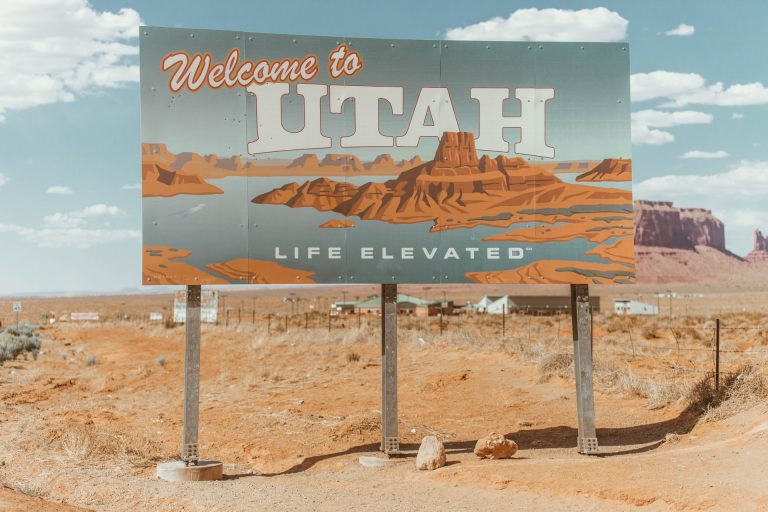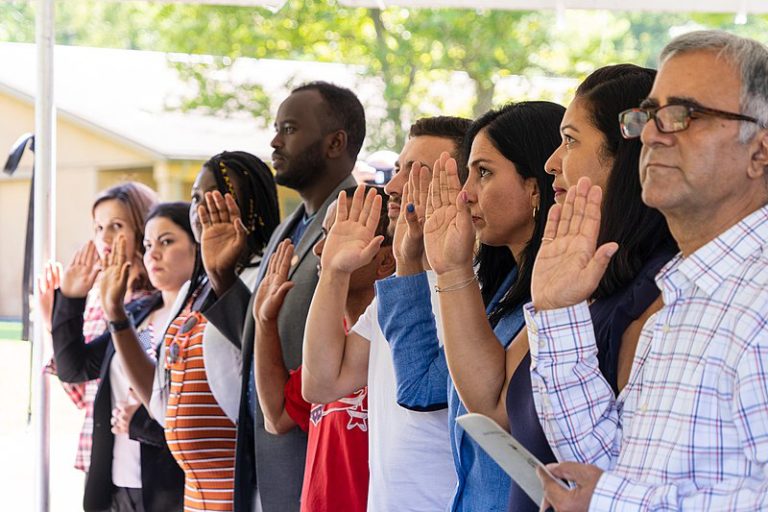 As a Republican in a deep red state, Gary Herbert caught many in his own party by surprise when he penned a 2019 letter to the Trump administration requesting permission for Utah to receive more refugees. Guided by a central principle that, as Americans, “we ought to treat people as humans,” Herbert often supports ideas that are not so popular with other Republicans. While in office, he supported legistlation — that ultimately failed — to give undocumented workers in Utah the opportunity to apply for legal status. Ideaspace talked to Herbert about that legislative effort and why he thinks states are the best place to tackle the most intractable immigration issues.
As a Republican in a deep red state, Gary Herbert caught many in his own party by surprise when he penned a 2019 letter to the Trump administration requesting permission for Utah to receive more refugees. Guided by a central principle that, as Americans, “we ought to treat people as humans,” Herbert often supports ideas that are not so popular with other Republicans. While in office, he supported legistlation — that ultimately failed — to give undocumented workers in Utah the opportunity to apply for legal status. Ideaspace talked to Herbert about that legislative effort and why he thinks states are the best place to tackle the most intractable immigration issues.
Ideaspace: You wrote a letter to the Trump administration asking to let Utah increase its refugee settlement. So as a starting point, it’d be great to hear what prompted you to write that letter?
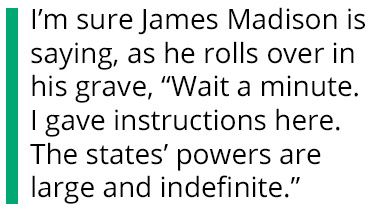 Gary Herbert: Well, I think we all start from the basis of human beings. We ought to treat people as humans. I’ve said many times we all belong to the same race, it’s called the human race. And humanitarian efforts that we have done as Americans throughout the world to try to help people, the basis for our goodness and our kindness. And, of course, America was certainly founded by immigrants. Not necessarily refugees, I think there’s a difference in definition. And so, we haven’t handled it, I think, very well in the past. I’m a little frustrated about the immigration system we have, and the refugees. Now, refugees, I would define as people who are fleeing persecution and they’re trying to find a safe haven. Immigrants can be looking for just a better way of life. South of the border, we know people that hop the fence, come through, get their visa, overstay their visa, a lot of ways to become undocumented as an immigrant. So there are two different categories.
Gary Herbert: Well, I think we all start from the basis of human beings. We ought to treat people as humans. I’ve said many times we all belong to the same race, it’s called the human race. And humanitarian efforts that we have done as Americans throughout the world to try to help people, the basis for our goodness and our kindness. And, of course, America was certainly founded by immigrants. Not necessarily refugees, I think there’s a difference in definition. And so, we haven’t handled it, I think, very well in the past. I’m a little frustrated about the immigration system we have, and the refugees. Now, refugees, I would define as people who are fleeing persecution and they’re trying to find a safe haven. Immigrants can be looking for just a better way of life. South of the border, we know people that hop the fence, come through, get their visa, overstay their visa, a lot of ways to become undocumented as an immigrant. So there are two different categories.
That being said, one of the core of situations for Utah is that it was settled by refugees. Those early Mormons were fleeing persecution. And in Missouri, for example, they had an extermination order, which meant you could actually shoot and kill Mormons because of their belief. And the governor at the time said, “We need to get rid of the Mormons…. Drive them out of state.” Hence the extermination order, which is on the books for many, many years, by the way.
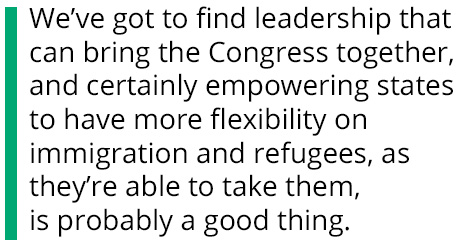 So I think we have some empathy for those who are looking for a safe place to live, raise their family. And part of that is our heritage as Utahns when those early pioneers came into Utah, led by Brigham Young in 1847, looking for a safe place to live and to worship without fear of persecution. And so, that’s part of it. I believe that we’re all God’s children regardless of ethnicity, and country of origin, and all those things. We’re all God’s children. Which means we’re all part of the same family, and that’s why I say we’re all part of one race called the human race. God’s children.
So I think we have some empathy for those who are looking for a safe place to live, raise their family. And part of that is our heritage as Utahns when those early pioneers came into Utah, led by Brigham Young in 1847, looking for a safe place to live and to worship without fear of persecution. And so, that’s part of it. I believe that we’re all God’s children regardless of ethnicity, and country of origin, and all those things. We’re all God’s children. Which means we’re all part of the same family, and that’s why I say we’re all part of one race called the human race. God’s children.
I: What do you think about the general idea of finding ways to empower states more on the matter of immigration policy? Do you see some wisdom in that or even a roadmap for how that might be done?
GH: Well, let me first tell you that I’m a big supporter of federalism, which it really is states rights. Sometimes people get confused with the word. Federalism sounds like we’re promoting the federal government, but the concept of federalism is really the states as the United States of America. Ronald Reagan famously reminded us all one time, “Look, the federal government didn’t create the states, the states created the federal government. We’re the originators.”
And, in Federalist 45, James Madison wrote, “The powers that we’ve given to the federal government are few and defined.” Few and defined, that’s the enumerated powers in the Constitution to the federal government. Madison went on, “The powers we’ve given to the states are numerous and indefinite.” So, again, I expect that right up until the New Deal, the states really did have primacy on things. And then the federal government has grown dramatically since that time. And I’m sure James Madison is saying, as he rolls over in his grave, “Wait a minute. I gave instructions here. The states’ powers are large and indefinite. The federal powers are defined and they’re few.” We the people have turned that upside down. We’re asking for the federal government to do more than they’re capable of doing, hence we’re running a 28, pretty soon to be a $30 trillion debt.
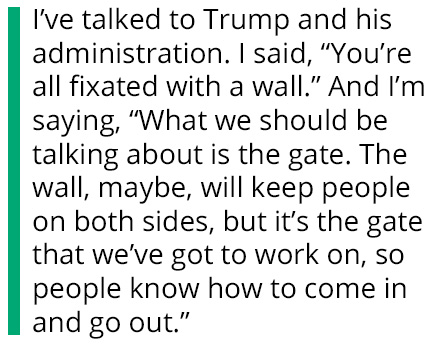 That being said, Utah we passed a law that gave the states the right to work with immigrants that were here undocumented and help bring them out of the shadows, and treat them with respect, and have them pay taxes. If the federal government wanted to deport them, that was their prerogative, but we want them to know that the state of Utah was willing to work with them and help them under their circumstances, unique as they might be.
That being said, Utah we passed a law that gave the states the right to work with immigrants that were here undocumented and help bring them out of the shadows, and treat them with respect, and have them pay taxes. If the federal government wanted to deport them, that was their prerogative, but we want them to know that the state of Utah was willing to work with them and help them under their circumstances, unique as they might be.
Well, the federal government under President Obama sued us, and they sued us and they won in court. And so, the courts have defined this immigration issue as a federal issue. I understand borders, and if you don’t have borders, you don’t have a country. Although our immigration system is not working very well, certainly could be improved, I do believe that is a federal issue. Now, the Congress could make modifications to laws or the Constitution and say, “We’re going to give the states more power to make those decisions. More latitude, more flexibility.” And I think that would be a good thing.
On this issue, I will tell you I spoke personally with President Obama while he was visiting Utah. I was riding with him in his limousine. We got talking about immigration and the complex and challenging problem that is. And he said, “Gary, the problem is we can’t get the Congress to do anything.” And that’s probably more truth than fiction. It’s getting the Congress to act and pass laws where we’re so divided is hard. So presidents then say, “Well, I’ll just do it by executive order.” And that’s not a good solution either. I remind him, I said, “Well, we tried to do it on a state basis and you sued us.”
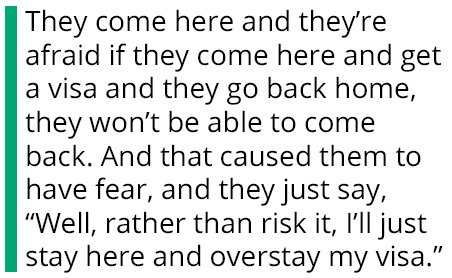 We’ve got to find leadership that can bring the Congress together, and certainly empowering states to have more flexibility on immigration and refugees, as they’re able to take them, is probably a good thing. I’m not sure every state views it the same way. So some states might take more refugees, be more tolerant on immigration than others. And you’d probably have a lack of uniformity across the board. That’s probably the only downside to that issue.
We’ve got to find leadership that can bring the Congress together, and certainly empowering states to have more flexibility on immigration and refugees, as they’re able to take them, is probably a good thing. I’m not sure every state views it the same way. So some states might take more refugees, be more tolerant on immigration than others. And you’d probably have a lack of uniformity across the board. That’s probably the only downside to that issue.
I: The reason Ideaspace is intrigued by this notion of finding ways to empower states is because, on the one hand, it speaks to people in the Republican Party who have been more concerned with states’ rights and it, I think, can read to people in the Democratic Party as an opportunity for some states, if they want to, to bring in more immigrants. And so, I think there might be some hidden possibility there.
GH: I’ve talked to Trump and his administration. I said, “You’re all fixated with a wall. You got to get the wall.” And I’m saying, “What we should be talking about is the gate. The gate’s not working. The wall, maybe, will keep people on both sides, but it’s the gate that we’ve got to work on, so people know how to come in and go out.”
We used to have a lot of migrant workers in my hometown — a lot of fruit orchards — who come in and work, then they go back to Mexico. But that’s not working now. They used to have visas where they come and work and go home. Most of them would like to go home. They come here because it’s a much better economic opportunity for them than where they came from.
When I was in Mexico, I’ve done a couple of trade missions there, worked with the former president before Obrador, and we talked about the need to improve NAFTA. I said, “But what we’ve got to do is see if we can improve the economy here in Mexico. If we can improve the economy, there’s no incentive for the Mexicans to hop the border.” We don’t worry about Canadians coming over the border, because there’s not really any economic advantage. Everybody else, the incentive for people to come to this country, particularly south of the border, is just better economics. They can make four, five, six times more money per day, and they can live and send money home to their families that they can’t make in their home country of Mexico and others.
So the gate’s not working very well. They come here and they’re afraid if they come here and get a visa and they go back home, they won’t be able to come back. And that caused them to have fear, and they just say, “Well, rather than risk it, I’ll just stay here and overstay my visa.”
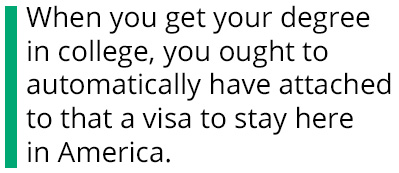 Look, all the departments of the federal government, they all lack efficiency. Government is a monopoly, there’s no pressure to be better. Immigration is probably the worst. And, again, how you handle people at the border, we have people rushing to find asylum, find a better life, and it’s heartbreaking to turn them down. I know separating kids from their families — which all administrations have done, it’s not just Trump — is a little bit hard to understand. And we ought to just sit down, and frankly, I wish Republicans and Democrats would sit down and say, “Let’s solve the problem. We may have to compromise, but we come to the table with an open mind and an attitude of compromise and finding a solution, because it’s not getting better.” I think as we help Mexico improve their economy, it may make it better, there’ll be less pressure, but we got a ways to go before we can get to that point.
Look, all the departments of the federal government, they all lack efficiency. Government is a monopoly, there’s no pressure to be better. Immigration is probably the worst. And, again, how you handle people at the border, we have people rushing to find asylum, find a better life, and it’s heartbreaking to turn them down. I know separating kids from their families — which all administrations have done, it’s not just Trump — is a little bit hard to understand. And we ought to just sit down, and frankly, I wish Republicans and Democrats would sit down and say, “Let’s solve the problem. We may have to compromise, but we come to the table with an open mind and an attitude of compromise and finding a solution, because it’s not getting better.” I think as we help Mexico improve their economy, it may make it better, there’ll be less pressure, but we got a ways to go before we can get to that point.
I: Recently I read through a proposal from U.S. Representative John Curtis, of Utah, for a state-based visa program. Are you familiar with that at all?
GH: Yes, I am. Congressman Curtis is a guy. I supported in his effort to run. He’s an intelligent guy, and smart, got a big heart. And he’s not trying to get on cable TV. Democrats go to MSNBC, they find the bomb throwers there. A Republican goes to Fox, they find the bomb throwers there to increase ratings. And it’s not to find solutions, it’s about ratings. I think cable TV, with all of its benefits to all of us in the information and all the options that we have there, it’s dividing the country more than it has ever been before.
The ones in Congress that are getting things done, like John Curtis, just kind of say, “I’m here. Roll up my sleeves, go to work, keep my head down. Not trying to throw bombs on cable TV and increase my national exposure.” He’s been a Republican, a minority in Congress, and I think he’s passed seven pieces of legislation signed by Donald Trump. So he’s looking for ways to have a special visa program where we can have people come. And, again, we’ve had them in the past. We have people come here on work visas, want to come here and work just for a part of the year and then go home.
I know a lot of even Republicans say, “We have these people, young people come here, we educate them. They get a great education here in America in our schools, and then what happens is we tell them they got to go home. You got a great education, some PhDs, then we say you got to go home because you’re not able to stay because you don’t have documentation.” And some have said, “When you get your degree in college, you ought to automatically have attached to that a visa to stay here in America.” That’s just an idea that’s out there.
And here’s my philosophy of life. I’m unabashedly a right of center conservative. But I’m moderate in tone and I’m inclusive in process. And so I don’t yell at people. I don’t call people names. I try not to put anybody down. I want to have mutual respect and civility in our discussion to get to a position of dialogue. That’s a two-way conversation.
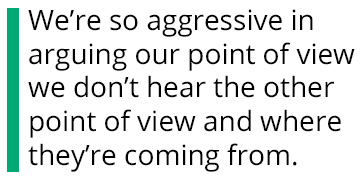
We had a famous fellow who wrote a book here and where I live in the Provo area, named Stephen Covey. And he wrote The 7 Habits of Highly Successful People. And one of his precepts was “Seek first to understand, and then to be understood.” We’re so aggressive in arguing our point of view we don’t hear the other point of view and where they’re coming from. We need to have better dialogue. So, that’s how I approached it.
When I was chairman of the National Governors Association, I said to all of them, “Look, I understand politics. I run on the Republican Party label. I like what they have in their party platform. And I support it because I think that will provide better outcomes for the majority of Americans than any other approach. But that being said, we don’t have all truths and knowledge just on one side of the ledger. Many times it’s a combination. So my suggestion to all of us, as governors, is to run on your platform, run on your label and that might be a Democrat, Republican, Libertarian, but when we get together, now that we’ve all gone through the election process, let’s take that label off of our foreheads of Republican or Democrat and replace it with common sense. Why don’t we all join the Common Sense party and try to get things done working together.
And I still believe that’s the way to do it. Sometimes common sense can bring us together. A common sense application of our principle or a common sense solution to the problem. As opposed to being ideologues where it’s my way or the highway. And I will not compromise on one point out of a hundred. And as I point out often, the greatest document ever created by mankind, certainly having to do with politics, our U.S. Constitution, was brought together by people who had very strong points of view, ideologies, philosophies, and they compromised to come up with what we now call the Miracle at Philadelphia in 1787, our Constitution. The greatest document.
We wouldn’t have done that without compromise, willingness to work together and find common ground. So why can’t we use that as the example? We’d come with a lot better respect for each other and actually get things done. Which right now, we’re not getting much done at all in Washington D.C. States, by the way, which I think are the best hope for America’s future, are still doing a pretty good job — Republican and Democrat.
Read More:
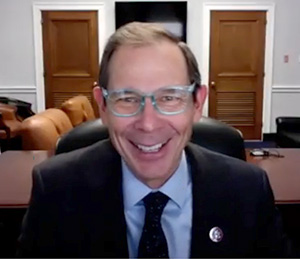
Capitol Hill Briefing No. 1
